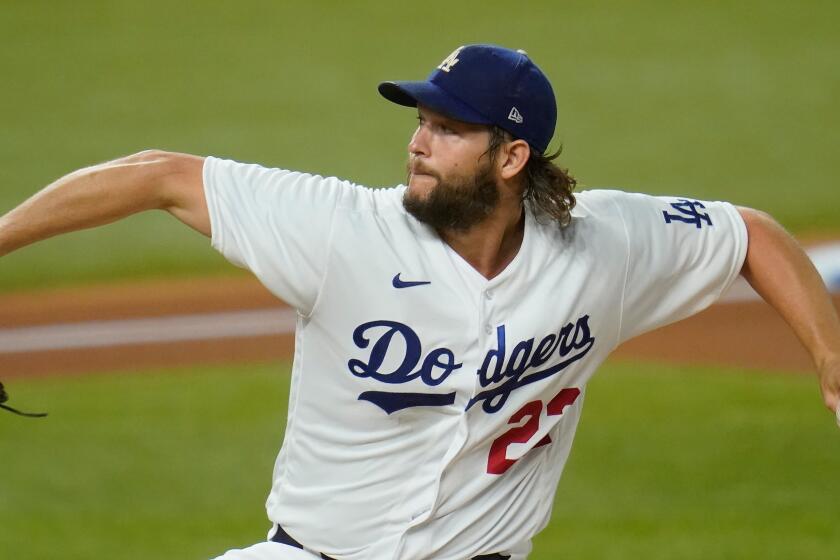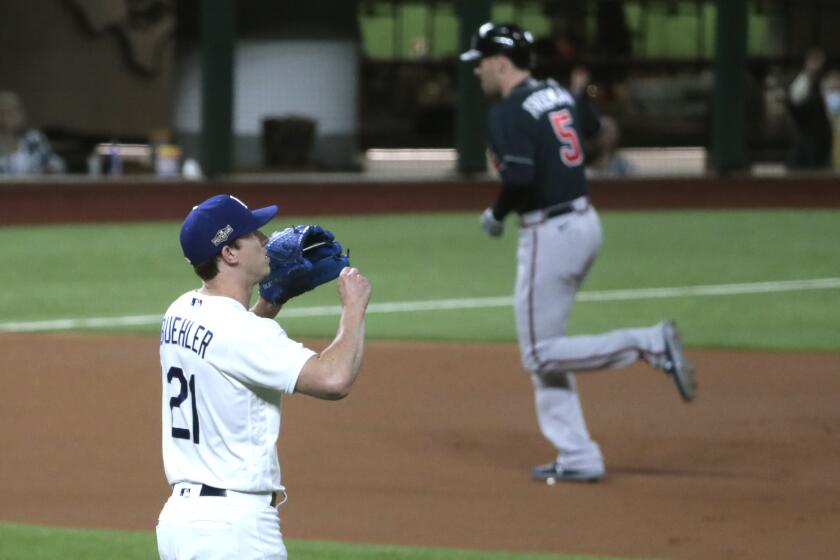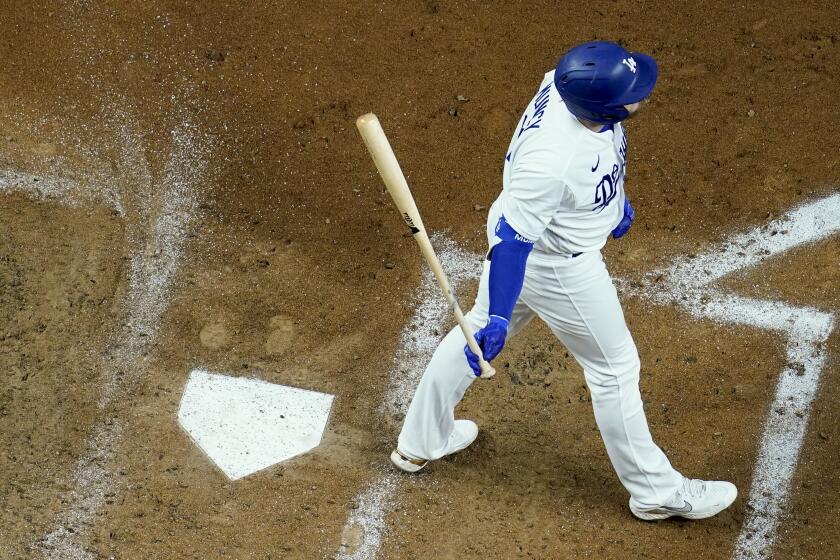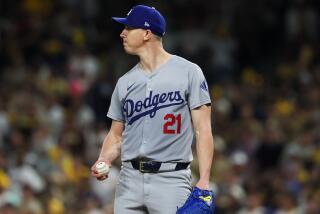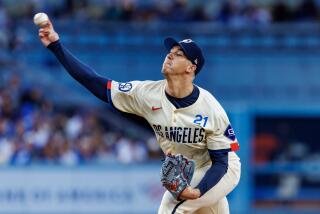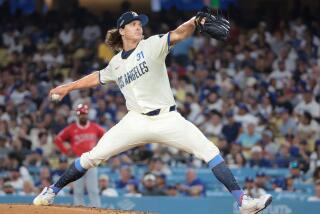Tony Gonsolin is the Dodgers’ Game 2 starter. He wasn’t even supposed to be a pitcher
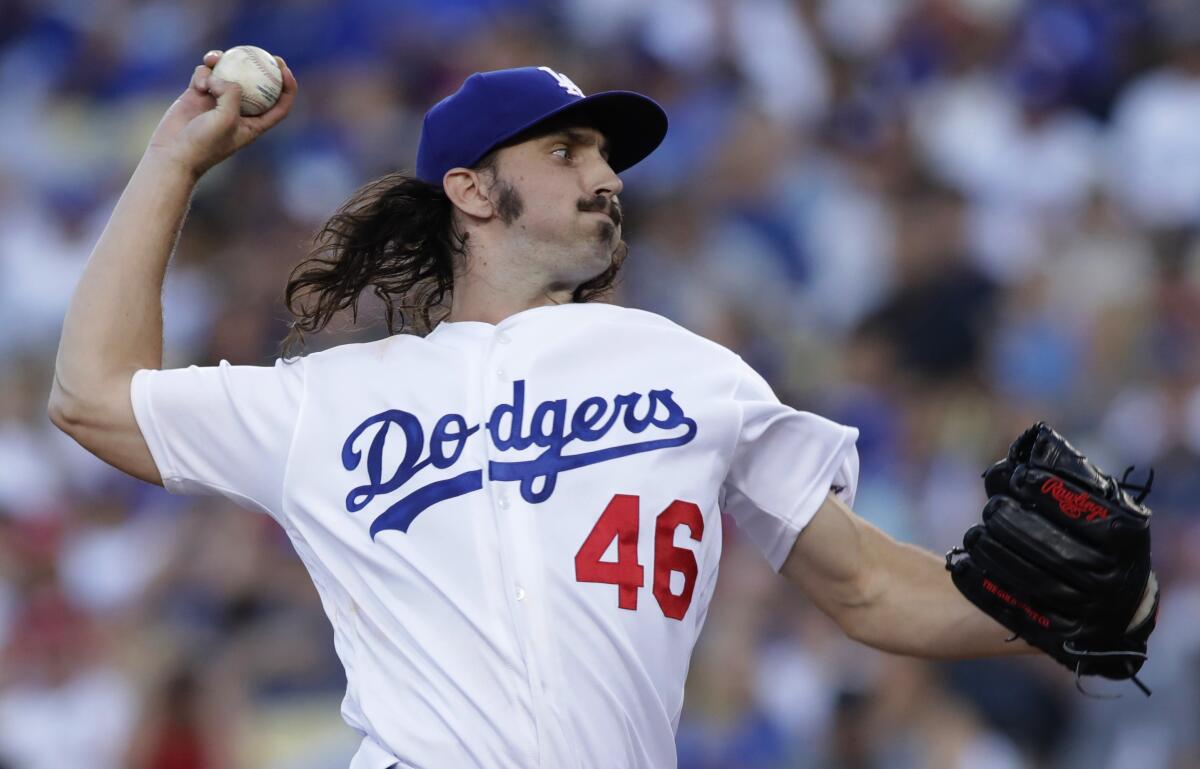
- Share via
At the start of his first year coaching the Saint Mary’s College baseball team in 2014, Eric Valenzuela had a problem.
The new coach didn’t have enough players. He didn’t have enough pitchers. He didn’t even have enough depth to stage a simple intrasquad scrimmage.
“That’s how tough that first year was,” Valenzuela said. “We were really thin.”
There wasn’t much time to address the roster either. It was too late to bring in new recruits or ready-to-play transfers or NCAA-caliber walk-ons.
Instead, Valenzuela had to get creative. To fill the final spots on the team, he held a campus-wide, Rudy-esque open tryout. And to complete his pitching staff, he approached any position player on the roster who had even the slightest bit of experience on the mound.
That was the first time Valenzuela saw Tony Gonsolin throw a baseball. It was the first step in the right-hander’s path to a big league mound.
Now a member of the Dodgers staff, Gonsolin will be called upon to alleviate a roster problem of a different kind in Tuesday’s NLCS Game 2. Clayton Kershaw was scratched from his start because of back spasms, so Gonsolin will make his postseason debut in the left-hander’s place, trying to prevent the Dodgers from falling into a two-game hole against the Atlanta Braves.
Dodgers’ Clayton Kershaw has been scratched from his Game 2 NLCS start against Atlanta with back spasms and Tony Gonsolin started in his place.
It was only six years ago, however, that Gonsolin was an outfielder by trade, a college sophomore who had success as a two-way player at Vacaville High School but pitched only 6⅓ innings and allowed seven runs as a part-time reliever in his first NCAA season.
“I never really saw myself as a pitcher first,” Gonsolin said. “I always thought I was a hitter — which clearly is very wrong.”
And if not for Saint Mary’s roster shortage in Valenzuela’s first year, it’s fair to wonder whether Gonsolin would have embarked on a full-time pitching career at all.
“Basically, he threw a bullpen because he said he pitched in high school — and he was electric,” Valenzuela said during a recent phone call. “It was raw, because he hadn’t pitched in a while. But there was definitely a lot there. A lot of stuff.”
Gonsolin’s delivery was rusty and his movements were disjointed. Like a car being started for the first time in years, his mechanics sputtered. But once he loosened up, he could still bring gas, hurling mid-90s mph fastballs across the plate and offspeed pitches with effortlessly natural late break.
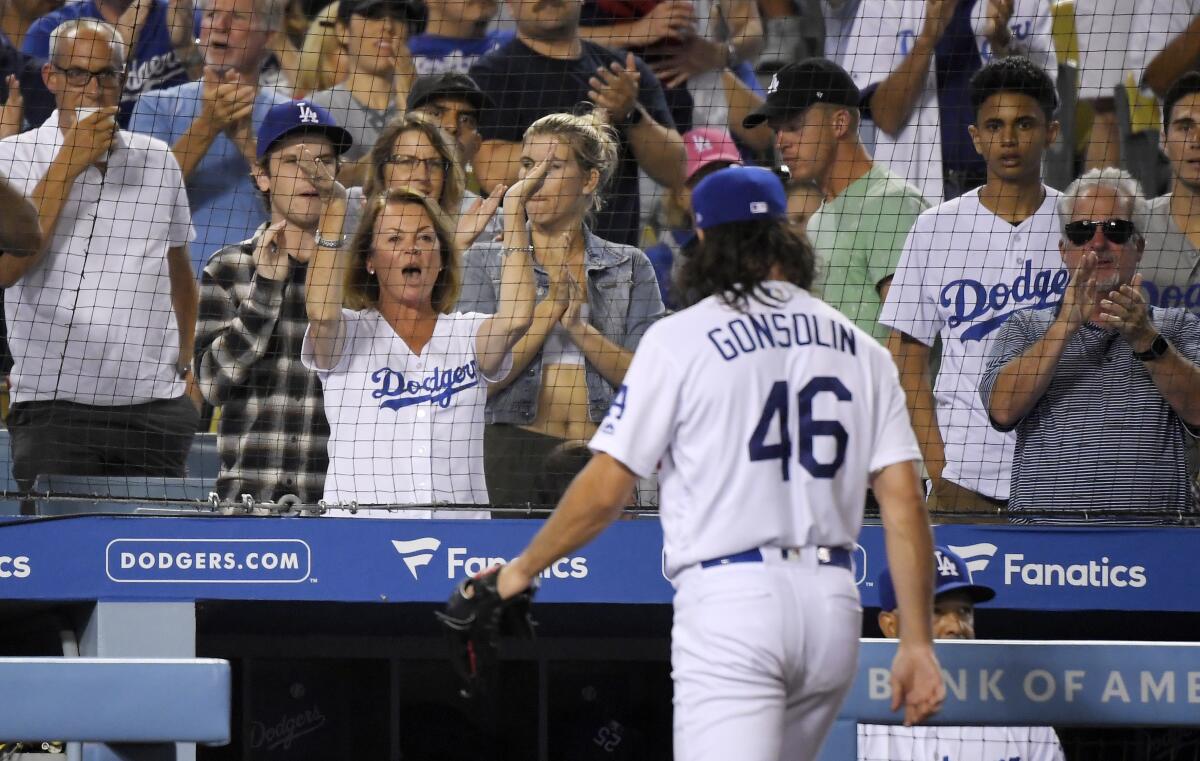
“Wow, man,” Valenzuela said to himself. “He looks pretty funky, but those are things we can fix. He just had it. The whip of his arm. The stuff … It’s a position player pitching, with an electric arm.”
For a while, that’s all Gonsolin wanted: to be a primary position player who only moonlighted on the mound.
“I focused a lot more on hitting mechanics than pitching,” Gonsolin said. “When I went in to pitch, it was just like an outfielder coming in to pitch. I didn’t really know exactly what I was doing.”
Gonsolin improved nonetheless, lowering his earned-run average to 4.32 in 2014 and 3.14 in 2015. Most nights, he would start in right field then switch to the mound late in games. As a junior, he led Saint Mary’s in both saves and stolen bases, all while batting .316.
“For Tony, there was no pressure,” Valenzuela said. “Just get on the mound, just have fun and let it fly. Because he always thought, until the day he got drafted, he was going to be a major league outfielder and hitter.”
Dodgers pitchers love to throw fastballs, and Braves hitters love to hit fastballs. That was a bad combination for L.A. in its NLCS Game 1 loss.
It wasn’t until his senior season in 2016, when Gonsolin became a regular starter in a Saint Mary’s rotation anchored by fellow future big leaguer Corbin Burnes, that those plans began to change.
After going undrafted the year before, Gonsolin received calls from teams considering him as a top-10 round pick. For the first time, he contemplated the potential of being a big league pitcher. And yet, part of him still wanted to believe his future was in the outfield. He and Valenzuela debated the point often.
“I’m not telling you you’re a bad hitter or not a good outfielder or can’t play in the big leagues [as a position player],” Valenzuela would tell Gonsolin. “But your stuff on the mound is electric. And you’re not even scratching the surface.”
Whenever Gonsolin pushed back, Valenzuela doubled down: “I don’t know, man. I think your future is going to be on the mound.”
After the Dodgers indeed took Gonsolin in the ninth round of the 2016 draft as a pitcher, “I didn’t say ‘I told you so,’” Valenzuela joked. But the coach couldn’t have been more right.
Gonsolin quickly got a professional education as a full-time pitcher. He abandoned a sinking fastball in favor of a four-seam grip. And with the help of retired pitcher Joel Peralta, he turned his changeup into a devastating splitter during 2017 spring training.
“I learned a lot about myself and pitching and all that stuff in that [first professional] season,” Gonsolin said. “I’m trying to grow on that every year.”
The Dodgers’ lack of offense in Game 1 of the NLCS against the Atlanta Braves is a worrying yet all too familiar development for the team.
An uptick in velocity helped too, allowing him to climb the minor league ladder in three years to make his MLB debut in June. This season, Gonsolin was one of the Dodgers’ most consistent starters, going 2-2 with a 2.31 ERA and 46 strikeouts in 46 ⅔ innings. On Tuesday, he’ll have an October start to his name as well.
Valenzuela, who has since become the coach at Long Beach State, thinks so too. Every time he watches Gonsolin pitch for the Dodgers, he remembers where the roots of his development took place. He reminisces about the early years of Gonsolin’s burgeoning pitching career. He relives the first bullpen session that convinced him this was all possible.
“He’s grown so much,” Valenzuela said. “When he gets in trouble or he gets behind hitters or gets in some jams, he’s really under control and he’s able to get out of them. He just gets better.”
More to Read
Are you a true-blue fan?
Get our Dodgers Dugout newsletter for insights, news and much more.
You may occasionally receive promotional content from the Los Angeles Times.

